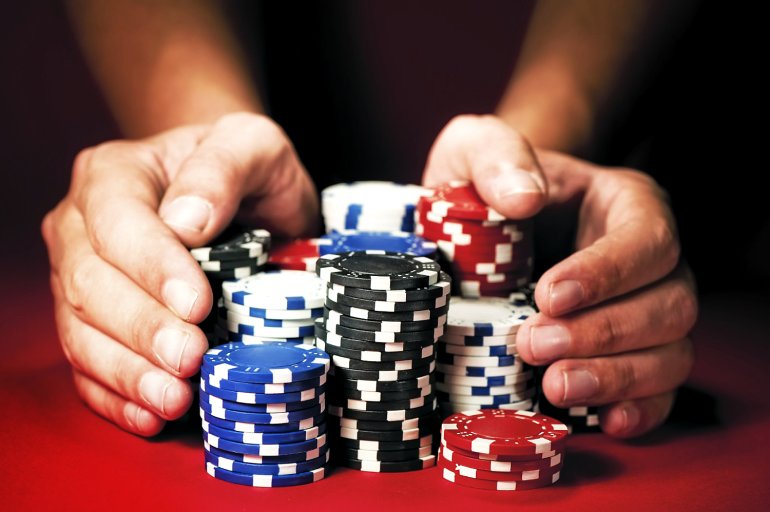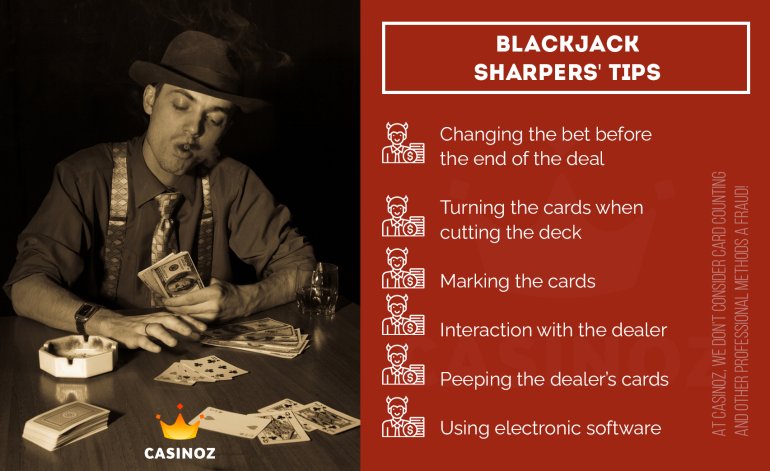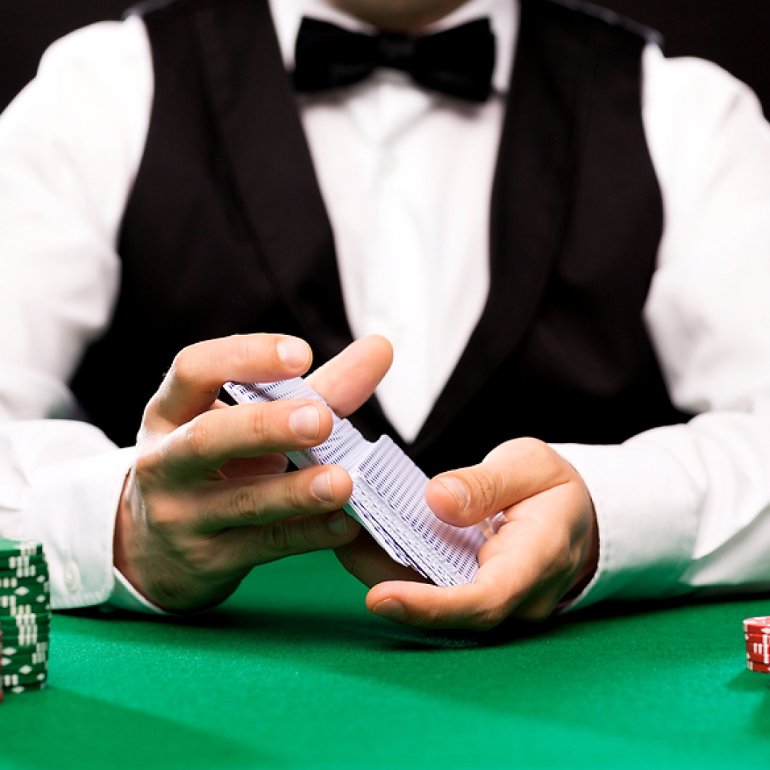
Blackjack is one of the most popular casino games, known for its blend of chance, skill, and strategy. But not everyone plays fair. While most players rely on legal advantage techniques like card counting, some resort to outright cheating. Professional cheats—often called card sharps—employ a variety of deceptive techniques to manipulate the game in their favor. These tricks range from sleight of hand to collusion, and casinos constantly fight to detect and prevent them.
We do not recommend that Casinoz readers use any methods described below.
Moreover, all the descriptions are in the form of an overview without going into detail. Some ways are universal for all card games; others are typical only for blackjack. Of course, this is not a complete list; it is constantly updated with new tricks.
We will not discuss the global history of card cheating since this topic is worth an entire book of several hundred pages. However, we will say that with the advent of gambling, cheaters immediately appeared. Since then, the process of improving security systems has not stopped, and cheaters have devised new ways to modify them.
The introduction of mandatory registration and quality surveillance has at least minimized repetitive cases of cheating by the same people, but ending this phenomenon is impossible for any casino.
How Can Card Sharps Cheat in Blackjack?
The ancient history of blackjack knows ingenious cheating.
There are many options of cheating in this game. Ban on touching the cards in mainstream blackjack limits players, but does not provide complete security for a casino.
We'll first consider the most famous techniques players use, then move on to the tricks used by some casinos.
Manipulating Bets
The most primitive and stubbornly refused-to-disappear trick is a late bet, as they say, all brilliant. Players develop new ways to change the bet size on the table. Before handing the camera, many chips are sometimes increased if the dealer does not show the amount bet. It is carried out so brilliantly that nothing is impossible to prove.
Dealers' attention is distracted by all possible means, and they can increase the bet on winning and, at losing, reduce it.

- Past Posting (Late Betting)
Past posting is the act of placing or increasing a bet after the outcome is known—usually after the dealer has dealt the cards.A
cheat may wait until they see their initial hand or the dealer’s upcard and then sneak extra chips onto their betting spot. This move often happens during a moment of distraction or when the dealer isn’t watching closely.
Casinos train dealers and surveillance staff to watch for any chip movement after the “no more bets” signal. Eye-in-the-sky cameras are constantly recording.
- Bet Capping
Similar to past posting, bet capping involves secretly increasing a bet after the cards have been dealt, without being authorized.
A player might bet a small stack, then stealthily add high-value chips on top when the dealer turns away or is distracted.
Cheats often use distractions or sleight of hand—like covering the chips with a handkerchief or faking a stretch.
- Chip Dumping and Switching
After a winning hand, a cheat might switch lower-value chips for higher ones to increase their payout—or pass off chips to a partner.
Quick hand movement, confusion during payouts, or collusion with others at the table.
Dealers are trained to verify original bets before paying out, and high-value chip movements are closely watched.
Manipulating Cards
Here are several tricks.
- Card Marking
Marking cards involves altering them in subtle ways so the cheat can identify specific values during play.Types of markings may include scratches or nicks on the edgesor daub (invisible ink visible with special lenses)
- Bent corners
In blackjack, knowing when a 10 or ace is coming can massively increase a player's advantage, especially in single-deck or double-deck games.
Frequent deck changes, pre-shuffled decks, and using plastic cards in some games help prevent this trick.
- Hand MuckingMucking
is the act of secretly removing, switching, or adding cards from the hand during play.A cheat might palm a strong card (like an ace) and introduce it later when it benefits them—say, turning a hard 16 into a 21.
This trick demands serious skill and often the help of a confederate or an inattentive dealer.
- Cold Decking
Cold decking is swapping the current deck for a prearranged one—stacked in a way that ensures the cheat gets favorable cards.Typically requires collusion with a dealer or a sophisticated distraction to swap the deck unnoticed.
This is one of the boldest cheating methods and is extremely rare in modern casinos due to rigorous security and deck tracking.
- Card Flicking
Another widely used technique is flicking through cards while cutting the deck. The player uses the plastic card to bend cards in the deck and peek into their indices.
Then, he inserts it in the right place. At the right card, the bet increases.
Sometimes a shoe is played in a single hand, which takes the maximum bets on the table. Proving cheating is challenging, so the dealer may compress or turn the deck, making it impossible to see the cards. This method is also applicable to other games (e.g., poker).
| Name | Soft | Return to player | ||
|
|
99.78% | |||
|
|
99.69% | |||
|
|
99.65% | |||
|
|
99.6% | |||
|
|
99.59% | |||
|
|
99.54% | |||
|
|
99.54% | |||
|
|
99.54% | |||
|
|
99.33% | |||
|
|
98.55% |
Collusion with Dealers
Tremendous opportunities are open to gamblers who can come into agreements with casino employees: dealers, pit bosses, etc. This allows you to play with marked cards, put on "loaded" shoes, etc.
Ironically, employees from various casinos have heard stories about how to start a new game after a blackjack player moved away from the table to the bar with a request not to close the table and change the shoe. Then, there were some scandals involving other persons under the guise of changing cards.
The artistry was so professional that even camera operators were distracted and did not follow the tables, and the protection and management were directly involved in settling the conflict. After that, the game was played at high bets, and cheaters were soon hidden. Of course, all was found out, but it was too late.
Other Tricks
Most casinos also know all kinds of cheating, like card counting, tracking, shuffle tracking, and sequencing, although they use only the players' knowledge and intellectual abilities.
Though much rarer today due to intense security, some cheats attempt to use:
- Hidden cameras or scanners to analyze shuffle patterns;
- Electronic signaling devices to communicate with partners;
- Miniature computers to predict card outcomes (famously banned in many jurisdictions).
Casinos universally ban electronic devices at the table for this reason.
How Can Casinos Cheat in Blackjack?
Unfortunately, casino owners do not stop cheating. There are many more features on their side, but the risk of losing customers is very high in case of failure. Therefore, various administration machinations usually selectively apply different techniques in each case.
If you cannot verify that all cards are in the shoe, change the chips back for money and go home. Here, you can do nothing. The lack of even a single ace of six decks significantly reduces your chances of winning. Ideally, all cards should be in your eyes. You must cut them and watch as they are inserted into a shoe. If you remove the finished shoe, it is unnecessary to agree.
- Firstly, it may not have all the cards.
- Secondly, they can be changed so that winning will be pretty problematic.
The most successful clients can use a shoe, charged with marked cards, and have the assistance of a decoy player. He knows the order of the cards in the shoe and, sitting on the top box, will get them so the dealer wins.

If the dealer knows the cuts of some unlucky players, he can divide the deck more in a shuffle and leave smaller cards to the last one for sheer. This can even be used with false trimming. As we know from basic strategy and counting systems, with whole playing decks dominated by small cards, you can not win.
Technical means are also used for cheating in blackjack. Special shoes allow the dealer to choose one of several cards. Of course, this technique is unlikely to go unnoticed by professionals, but it is suitable for amateur players. The same applies to the so-called "mistakes" of the dealer, resulting in casinos usually do not make any payments. This is the roughest way, but it exists.
| Casino | Bonuses | Editors rating | |||
| 100% to 1000 $ x35 |
Play
T&C applies, 18+
|
||||
| — |
Play
T&C applies, 18+
|
||||
| — |
Play
T&C applies, 18+
|
||||
| 100% to 400 $ x50 |
Play
T&C applies, 18+
|
||||
| — |
Play
T&C applies, 18+
|
Conclusion
Card sharps rely on boldness, dexterity, psychology, and teamwork to beat the system. But modern casinos are no slouches—they invest heavily in security technology, dealer training, and surveillance to keep the game fair. While blackjack can be beaten legally through advantage play, cheating crosses a line with serious consequences. So, if you aim to win at blackjack, your best bet is to learn smart strategies, not sleight-of-hand tricks.
We can only recommend you play in trustworthy casinos if you do not want to use illegal methods.









































